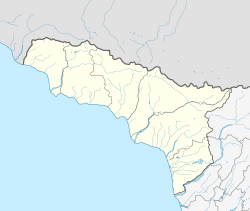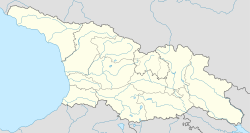Psakhara
In the article below, the topic of Psakhara will be addressed from a broad and detailed perspective. Psakhara is a topic of great relevance in today's society, which has sparked numerous debates and controversies in different areas. Over the last decades, Psakhara has gained special importance and has been the subject of studies and research by experts in the field. In this article, various aspects related to Psakhara will be explored, such as its origin, evolution, impact on society, and possible solutions or alternatives to deal with it. In addition, different approaches and points of view on Psakhara will be analyzed, in order to offer a complete and enriching vision of this topic that is so relevant today.
Psakhara
Kolkhida | |
|---|---|
Village (and municipality) | |
| Coordinates: 43°15′10″N 40°17′45″E / 43.25278°N 40.29583°E | |
| Country | |
| Occupied by | Abkhazia[1] |
| District | Gagra |
| Government | |
| • Mayor | Akhra Abijba[gcity 1] |
| • Deputy Mayor | Beslan Dziapshipa[gcity 1] |
| Elevation | 20 m (70 ft) |
| Population (1989) | |
• Total | 3,102[2] |
| Time zone | UTC+3 (MSK) |
Psakhara or Kolkhida (Georgian: კოლხიდა, Kʼolkhida; Abkhaz: Ԥсахара, Phsachara) is a village at an altitude of 20 meters from sea level in the Gagra District of Abkhazia.[note 1] Official status of urban-type settlement was received in 1982.
See also
Notes
- ^ The political status of Abkhazia is disputed. Having unilaterally declared independence from Georgia in 1992, Abkhazia is formally recognised as an independent state by 5 UN member states (two other states previously recognised it but then withdrew their recognition), while the remainder of the international community recognizes it as de jure Georgian territory. Georgia continues to claim the area as its own territory, designating it as Russian-occupied territory.
References
Gagra District Administration
- ^ a b "Администрация городов, сёл и посёлков Гагрского района". Gagra District Administration. Archived from the original on 26 September 2012. Retrieved 28 May 2012.
Other
- ^ The political status of Abkhazia is disputed. Having unilaterally declared independence from Georgia in 1992, Abkhazia is formally recognised as an independent state by 5 UN member states (two other states previously recognised it but then withdrew their recognition), while the remainder of the international community recognizes it as de jure Georgian territory. Georgia continues to claim the area as its own territory, designating it as Russian-occupied territory.
- ^ "All-USSR census 1989 in Abkhazian ASSR". pop-stat.mashke.org. Retrieved 2016-08-01.
Literature

